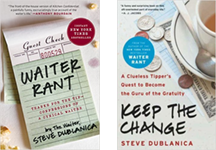A few weeks ago, a father called me and asked if his children could volunteer at my food pantry.
“I was raised with nothing,” he told me. “Then I got lucky and made a lot of money. Now I live in a big house in a Richburg. My kids want for nothing. But that’s not how life works for most people, you know? I want them to be grateful for what they have. Develop some empathy.”
These requests come from time to time and I explained to the father that I didn’t let children volunteer at the food pantry for various reasons – security, confidentiality and the fact there wouldn’t be a lot for them to do. When the man heard this, he expressed disappointment. “I was hoping they could so some hands-on work with people.”
“Why don’t you help your children organize a food drive?” I offered. “I’ll give them a list of things to collect and then they can bring them here. I’ll give them a tour, explain what we do. Children usually ask good questions.”
“We could do that.” I rattled off a list of items the pantry needed and the man repeated them back to me.
“Laundry detergent, huh?” he said. “I wouldn’t have thought of that.”
“Food stamps don’t cover cleaning products,” I said. “By getting that stuff at the pantry it frees up money to buy more food.” Then there was as a long period of silence and I thought we’d been disconnected.
“Are you there, sir?’
“Yeah,” the man said. “Sorry, I was thinking. You have kids?”
“One,” I said. “A girl.”
‘Tough teaching them about this stuff.”
“Last week a little kid had a birthday party,” I said. “Instead of presents, she asked her friends to bring food for the pantry. Isn’t that something? Her parents didn’t put her up to it. Entirely self-generated.”
“That’s nice,” the man said.
“And I know a little girl who lives in your town who, instead of Christmas presents, asked to adopt a Syrian refugee. Children know people have less than them and they’ll surprise you with their generosity, but it has to come from them, on their schedule, on their terms.”
“My kids seem to be interested only in video games,” the father said, laughing.
“They’re not, trust me,” I said. “But you know our children watch us like hawks, right?’
“Oh yeah.”
“They’re going to follow our example,” I said gently. “How do we view money? How do we react to our good luck and the misfortune of others? I worry about the example I’m setting for my daughter so I’m the same boat as you. Frankly, this stuff should worry all of us.”
The man was silent again and not for the first time I wondered if I overstepped my bounds.
“Thank you for your advice,” the man eventually said. “I’ll get that stuff to you a week or so.”
“I look forward to meeting you and your children.”
After cradling the phone, I sat back in my chair and thought about the wealthy parish I worked in when I was in the seminary. I was a young firebrand back then and one day I spouted off to the pastor about how out of touch his wealthy congregants were.
“The rich have souls too,” he told me. “I’m just trying to get them through the eye of the needle.”
When I think about it, that pastor had a tough job. Riches can cause suffering as acute as poverty. I know this is true because I once worked in a psych hospital that catered to the rich and famous. When you’ve dealt with millionaires miserable to the point of suicide you start wondering if Jesus had a point. “Again I tell you, it is easier for a camel to go through the eye of a needle than for someone who is rich to enter the kingdom of God.” How did my old pastor sell that to his parishioners?
Today, if that job fell to me, I’d tell my congregation about Chuck Feeney. An Irish-American entrepreneur who made his fortune in duty free shops and savvy investments, Feeney, over the course of 35 years, gave away 8 billion dollars to various philanthropic causes. He tried donating this money anonymously but a legal issue eventually revealed his incredible largesse to the world. Nevertheless, he has never sought public praise or acknowledgement and no buildings are named after him. Never ostentatious with his cash, he’d always fly coach, carrying his paperwork around in a plastic bag. Now 85, he’s down to his last 2 million and living in a rented apartment in San Francisco.
Chuck Feeney gave away 99.75% of his money. No one has ever given that percentage of their fortune to charity. And that two million Feeney still has? He told Warren Buffet he hopes that last check he writes “will bounce.” Chuck wants to die broke.
If it is earned honestly, there’s no sin in making money. The real sin is hanging on to a lot of money. As The Panama Papers demonstrated, many rich people hoard money. Why? Perhaps they equate money with security, freedom and power. Now If you talk to wealthy people they might tell you that’s true to a point but, if they’re honest, they’ll also tell you that riches can be a burden – bringing about terrors, shackles and impotence just as fearsome as poverty. If a person uses their money to indulge themselves in materialistic pleasures and ignores the plight of the less fortunate, they’re headed for trouble. Inevitably their consciences will be lacerated and money will give them no pleasure. We are all headed for the eye of the needle, no matter how you define it. What will we take with us? Nothing, that’s what.
Chuck Feeney possessed great wealth but it never possessed him. Instead he poured his great fortune back into society. I don’t know what religion, if any, Feeney subscribes too, but I think he probably heard another thing Jesus once said about riches. “If you wish to be perfect, go, sell what you have and give to the poor, and you will have treasure in heaven. Then come, follow me.”
The father who called me has his work cut out for him, we all do. Trying to teach our children about real treasure can only be done through example. Do we give that bum a dollar or tell our children, “Don’t end up like him?” Do we give to charity, volunteer at the food pantry or help our neighbors in need? Do we value our relationships more than cash? Remember, our children are watching us like hawks. When they encounter life’s sorrows and unfairness they’ll remember what we did. And when my daughter asks me about money, I’m going to tell her about Chuck Feeney – a man who threaded the eye of the needle with grace and class.
Crap. Now if win the lottery I’ll have to put my money where my mouth is.


It’s always tricky in this world, how do you reconcile the desire for success with the desire to do right by your fellow man.
Thank you for the post.
Great post. You always leave me with something important to reflect on.
Since my son was a baby, I have tried very hard to teach him to give to others. My husband and I have done it in front of him – every Christmas we give to the giving tree at my husband’s office. My son sees us pick tags off the Christmas trees at malls and buy something. When we see people who are without, my son has learned to go with his instincts and he’ll ask me if we can buy the person a bag of food or if I have a spare $5 to give them. I’ve explained to him what we are buying and why – a loaf of bread, peanut butter, jam, bottled water etc things that will last for a week. He’s 11 and I explain to him that people end up in the situation of being without money or a home – that it’s because things go very badly for some people, that some times people get addicted to drugs and cannot know how to get free, etc. Every parent has to choose how to explain how to reach out to others and help others.
Great post. I read your blog years ago when you were still working at the Bistro. Glad to see you still writing it!
Great piece. I used to be in philanthropy, and it’s got its good side and its dark side. At its worst it strokes the egos of the rich; they get their name on a building, but they never pass through the eye of the needle. At its best, it makes better those who give, whatever they can give. Thank you for teaching that father about that side of giving, and what it can teach. – Bob D.
(Accidentaly place in spam folder. Sorry, Bob. Let me know if your subsequent comments get through. – Steve)